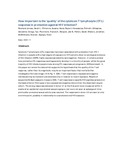How important is the ‘quality’ of the cytotoxic T lymphocyte (CTL) response in protection against HIV infection?

View/
Date
2001-11Author
Rowland-Jonesa, Sarah L.
Pinheiroa, Susana
Kaula, Rupert
Hansasutaa, Pokrath
Gillespiea, Geraldine
Donga, Tao
Plummerb, Francis A.
Bwayob, Job B.
Fidlerc, Sarah
Weberc, Jonathan
McMichaela, Andrew
Appaya, Victor
Type
ArticleLanguage
enMetadata
Show full item recordAbstract
Cytotoxic T lymphocyte (CTL) responses have been associated with protection from HIV-1 infection in people with a high degree of exposure to HIV and who show no serological evidence of HIV infection (HEPS, highly exposed persistently seronegative). However, it remains unclear how protective CTL responses could apparently develop in a minority of people, whilst the great majority of HIV-infected people make strong CTL responses yet progress to AIDS and death. In this paper we review the data which supports the hypothesis that the quality of the T-cell response, rather than its magnitude, may be an important factor that merits further investigation.Full-size image (15 K)
Fig. 1. CD8+ T-cell responses in exposed seronegative individuals may be transient and detected only in relation to recent exposure. Results of sequential ELISpot assays to measure CD8+ T-cell responses to specific HIV peptides selected on the basis of donor HLA types in two exposed seronegative donors from the discordant couple cohort. The strong responses detected in donor U1 at the first point were measured within 3 weeks of an accidental unprotected sexual exposure, but were not seen at subsequent time-points after protected sexual activity was resumed. The responses in donor U2 are seen at only one time-point, possibly in relationship to unprotected oral HIV exposure.
URI
http://erepository.uonbi.ac.ke:8080/xmlui/handle/123456789/41434http://www.ncbi.nlm.nih.gov/pubmed/11595285
Citation
Immunology LettersPublisher
Department of Medical Microbiology, P.O. Box 19676, University of Nairobi, Nairobi, Kenya MRC Human Immunology Unit, Institute of Molecular Medicine, John Radcliffe Hospital, Headington, Oxford OX3 9DS, UK Department of Genito-Urinary Medicine, Imperial College School of Medicine at St. Mary's Hospital, Paddington, London, UK
Collections
- Faculty of Health Sciences (FHS) [10378]
